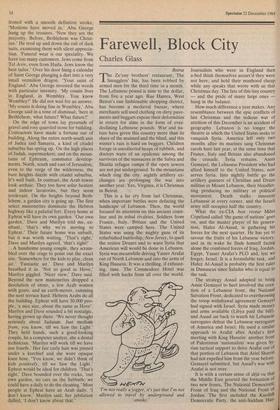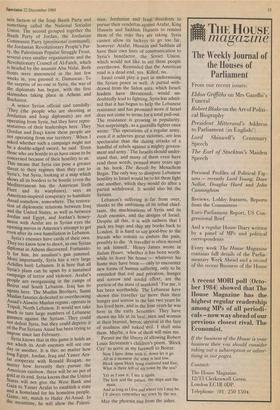Farewell, Block City
Charles Glass
Beirut he Ze'eny brothers' restaurant, The .1. Smugglers' Inn, has been robbed by armed men for the third time in a month. The Lebanese pound is nine to the dollar, from five a year ago. Rue Hamra, West Beirut's one fashionable shopping district, has become a medieval bazaar, where merchants sell used clothing on dirty pave- ments and beggars expose their deformities in return for alms in the form of ever- declining Lebanese pounds. War and na- ture have given this country more than its share of the maimed and the blind, and this winter's rain is hard on beggars. Children forage in uncollected heaps of rubbish, and doctors warn of an epidemic among the survivors of the massacres in the Sabra and Shatila refugee camps if the open sewers are not put underground. In the mountains which ring the city, nightly artillery ex- changes are prolonging the war into another year. Yes, Virginia, it is Christmas in Beirut.
This is a far cry from last Christmas, when important battles were defacing the landscape of Lebanon. Then, the world focused its attention on this ancient coast- line and its tribal rivalries. Soldiers from France, Italy, Britain and the United States were camped here. The United States was using the mighty guns of its refurbished battleship, New Jersey, to quell the restive Druzes and to warn Syria that American will would be done in Lebanon. Syria was meanwhile driving Yasser Arafat out of North Lebanon and into the arms of King Hussein. It was a thrilling, if exhaust- ing, time. The Commodore Hotel was filled with hacks from all over the world.
'I'm not really a jogger, it's just that I'm not allowed to travel by underground and smoke.' Journalists who were in England then a-bed think themselves accurs'd they were not here, and hold their manhood cheap while any speaks that wrote with us that Christmas day. The fate of this tiny country — and the pride of many large ones — hung in the balance.
How much difference a year makes. Any resemblance between the epic conflicts of last Christmas and the tedious war of attrition of this December is an accident of geography. Lebanon is no longer the theatre in which the United States seeks to vanquish Syria. America left only two months after its marines sang Christmas carols here last year, at the same time that France, Italy and Britain also abandoned the crusade. Syria remains. Amin Gemayel, the Lebanese President who had allied himself to the United States, now serves Syria. Into nightly battle go the artillery gunners of Christian and Druze militias in Mount Lebanon, their bloodlet- ting producing no military or political movement. Death stalks innocent Lebanese at every corner, and the Israeli army still occupies half the country.
What the ex-CIA bon viveur Miles Copeland called 'the game of nations' goes on, and the master player of his genera- tion, Hafez Al-Assad, is gathering his forces for the next quarter. He has yet to savour the fruits of his Lebanese victory, and in its wake he finds himself facing alone the combined forces of Iraq, Jordan, Egypt, Yasser Arafat's PLO and, lest we forget, Israel. It is a formidable task, and Hafez Al-Assad is probably the first ruler in Damascus since Saladin who is equal to the task.
The strategy Assad adopted to bring Amin Gemayel to heel involved the crea- tion of a Lebanese front, the National Salvation Front, dedicated to overthrowing the troop withdrawal agreement Gemayel had signed with Israel. Syria made money and arms available (Libya paid the bill), and Assad sat back to watch his Lebanese surrogates defeat the Lebanese surrogates of America and Israel. He used a similar approach to Arafat after Arafat's first meeting with King Hussein: another front of Palestinian 'nationalists' was given Sy- rian tactical support to drive Arafat out of that portion of Lebanon that Ariel Sharon had not expelled him from the year before. Gemayel submitted, but Assad's war with Arafat is not over.
It is with a certain sense of deft) vu that the Middle East greeted the formation of two new fronts, The National Democratic Front of Iraq and the National Front of Jordan. The first included the Kurdish Democratic Party, the anti-Saddam HIS' sein faction of the Iraqi Baath Party and something called the National Socialist Union. The second grouped together the Baath Party of Jordan, the Jordanian Communist Party (provisional command), the Jordanian Revolutionary People's Par- ty, the Palestinian Popular Struggle Front, several even smaller organisations and the Revolutionary Council of Al-Fateh, which• Is headed by the assassin Abu Nidal. Both fronts were announced in the last few weeks in, you guessed it, Damascus. To the surprise of no-one in Syria, the war of the diplomats has begun, with the first skirmishes taking place in Athens and Bucharest.
A senior Syrian official said candidly: They (the people who are shooting at Jordanian and Iraqi diplomats) are not operating from Syria, but they have repre- sentatives of their leaderships here. They (Jordan and Iraq) know these people are not operating from our territory.' When I asked whether such a campaign might not be a double-edged sword, he said: 'Even those who are hostile to us have cause to be concerned because of their hostility to us.' This means that Syria can pose a greater threat to their regimes than they can to Syria's, but Syria, looking at a map which shows all its borders to be hostile (even the Mediterranean has the American Sixth Fleet and its warplanes), sees an American-inspired conspiracy to humiliate Assad somehow, somewhere. The restora- tion of diplomatic relations between Iraq and the United States, as well as between Jordan and Egypt, and Jordan's honey- moon with Arafat are in Syrian eyes the opening moves in America's attempt to get even after its own humiliation in Lebanon.
Syria's enemies have cards of their own. They too know how to shoot, as one Syrian diplomat in Athens discovered. Fortunate- ly for him, his assailant's gun jammed. More importantly, Syria has a very large Achilles heel: Lebanon. It is here that all Syria's plans can be upset by a sustained campaign of terror and violence. Arafat's People are reorganising in the camps of Beirut and South Lebanon. Iraq has its agents here. The Muslim Brothers, Sunni Muslim fanatics dedicated to overthrowing Assad's Alawite Muslim regime, operate in Tripoli, North Lebanon. It would not take much to turn large numbers of Lebanese gunmen against the Syrians. They could not defeat Syria, but they could deprive it Of the Pax Syriana Assad has been trying to Impose since last February.
Syria knows that in this game it holds an ace which its Arab enemies will see one day or another. It is this: no matter how lung Egypt, Jordan, Iraq and Yasser Ara- fat cooperate with Ronald Reagan, no matter how fervently they pursue the American rainbow, there will be no pot of gold at its end. Syria knows that the United States will not give the West Bank and Gaza to Yasser Arafat to establish a state and a homeland for his homeless people. Game, set, match to Hafez Al-Assad. In the meantime, he will allow the Palesti-
nian, Jordanian and Iraqi dissidents to pursue their vendettas against Arafat, King Hussein and Saddam Hussein to remind them of the risks they are taking. Syria cannot allow its lackeys to go too far, however: Arafat, Hussein and Saddam all have their own lines of communication to Syria's benefactor, the Soviet Union, which would not like to see these people overthrown. Reminded that the American road is a dead end, yes. Killed, no.
Israel could play a part in undermining the Syrian peace as well. A partial with- drawal from the Sidon area, which Israeli leaders have threatened, would un- doubtedly lead to fighting. Syria has admit- ted that it has begun to help the Lebanese resistance and has promised more if Israel does not come to terms fora total pull-out. The resistance is growing in popularity. Not surprisingly, as a guerrilla fighter once wrote: 'The operations of a regular army, even if it achieves great victories, are less spectacular than the daring attacks of a handful of rebels against a mighty govern- ment and army.' The Israelis should under- stand that, and many of them even have read these words, penned many years ago in his book The Revolt by Menachem Begin. The only way to dissipate Lebanese hostility to Israel would be to let them fight one another, which they would do after a partial withdrawal. It would also hit the Syrians. Lebanon's suffering is far from over, thanks to the ambitions of its tribal chief- tains, the machinations of Syria and its Arab enemies, and the designs of Israel. Despite all this, it is with sadness that I pack my bags and ship my books back to London. It is hard to say good-bye to the friends who remain to endure the pain, possibly to die. 'A traveller is often moved to ask himself,' Henry James wrote in Italian Hours, `whether it has been worth- while to leave his home — whatever his home may have been — only to encounter new forms of human suffering, only to be reminded that toil and privation, hunger and sorrow and sordid effort, are the portion of the mass of mankind.' For me, it has been worthwhile. The Lebanese have shown this traveller far more than their hunger and sorrow in the last two years he has lived here, and in the four years he was here in the early Seventies. They have shown me life at its best, men and women at their bravest, heroic survival in the face of madness and naked evil. I shall miss them. Maybe, a few of them will miss me.
Permit me the liberty of allowing Robert Louis Stevenson's children's poem, `Block City' to serve as my farewell to Beirut: Now I have done with it, down let it go All in a moment the town is laid low.
Block upon block lying scattered and free, What is there left of my town by the sea?
Yet as I saw it, I see it again, The kirk and the palace, the ships and the main.
And as long as I live and where'ere I may be, I'll always remember my town by the sea.
May the phoenix rise from the ashes.







































































 Previous page
Previous page